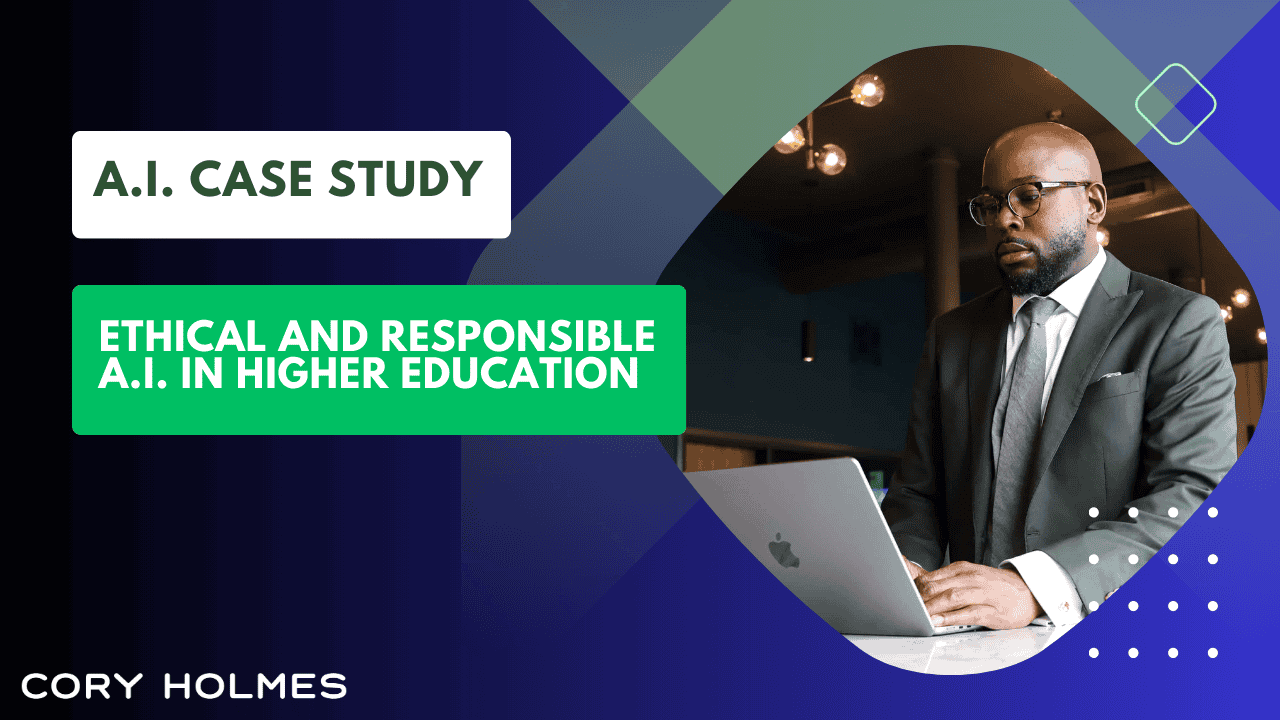AI Case Study: Ethical and Responsible AI in Higher Education

ShowMe State University (SMSU), a large public institution with a student population of 20,000, is seeing a trend and growing demand for personalized academic advising. To enhance the student experience, reduce administrative workload, and streamline processes around course enrollments and applying for graduation, the university decided to leverage Artificial Intelligence and develop an AI-powered Academic Advisor.
Overview
This Generative AI application would advise students on course selection based on their grade level and degree requirements, assist with class enrollment, and support senior level students in completing graduation applications.
The AI application is trained on student data from various sources, including academic records, advising history, and course catalogs. Given the sensitive nature of the data involved, the university was committed to ensuring that the AI system adhered to the highest ethical and compliance standards, particularly concerning student privacy.
The U.S. Department of Education's regulations, including the Family Educational Rights and Privacy Act (FERPA) and the Protection of Pupil Rights Amendment (PPRA), provided the legal framework that SMSU needed to follow to protect student data.
The Challenge
The primary challenge faced by ShowMe State University was balancing the innovative potential of the AI Academic Advisor application with strict adherence to ethical standards and legal requirements. Specifically, the university needed to address the following issues:
- Data Governance and Quality: Ensuring that the Gen AI application was trained on accurate, up-to-date, and clean data.
- Student Privacy Protection: Complying with FERPA and PPRA regulations to protect students' personal information from unauthorized access or misuse.
- Bias Mitigation: Preventing the AI application from making biased or unfair recommendations that could disadvantage certain groups of students.
- Registrar "Human in the loop" Review: Implementing a process where the Gen AI's recommendations were reviewed by a member of the Registrar’s office to ensure compliance with university policies and legal requirements. This is also good for "one-off" exceptions that the Gen AI application may not be able to make a sound decision on.
- Promoting a Sense of Belonging: Ensuring that the AI’s responses and recommendations fostered an inclusive environment, making all students feel supported and valued.
The Solution
To address these challenges, ShowMe State University developed a comprehensive approach that combined technical, administrative, and ethical measures:
- Data Governance and Quality:
- The university employed a multi-disciplinary team, including data scientists, ethicists, and educational experts, to oversee the data used for training the AI system. This team ensured that all data was accurate, relevant, and biases were kept to a minimum.
- The data was also anonymized where possible to minimize the risk of exposing personally identifiable information (PII).
- Student Privacy Protection:
- SMSU implemented robust access controls to ensure that only authorized personnel could access sensitive student data. The AI system itself was designed to exclude any PII from being exposed and was regularly audited to ensure compliance with FERPA and PPRA requirements.
- Security, Ethical, Legal and compliance departments were consulted at every stage of development to ensure that the AI tool met all legal obligations.
- Bias Mitigation:
- The AI system underwent rigorous testing to identify and reduce biases presented in the data and application. This included regular audits and updates to the AI’s algorithms to prevent any unintentional discrimination based on any particular student groups.
- Registrar Review:
- Recommendations made by the Generative AI application were reviewed by a member of the Registrar’s office before being finalized. This review process helped ensure that the AI’s suggestions were in line with university policies and that any potential issues were addressed before students acted on the advice.
- Promoting a Sense of Belonging:
- The AI system was designed with inclusivity in mind, using language and recommendations that supported the university’s commitment to diversity and inclusion. This approach helped foster a sense of belonging among students from all backgrounds.
The Results
The implementation of the AI Academic Advisor application at ShowMe State University was a success. Here were the outcomes:
- Enhanced Student Experience: Students reported high levels of satisfaction with the AI Academic Advisor, appreciating the personalized and timely guidance it provided.
- Improved Administrative Efficiency: The Generative AI application significantly reduced the workload of academic advisors and other members in the Registrar’s office, allowing them to focus on more complex student needs.
- Compliance and Trust: The university successfully navigated the complex regulatory environment, ensuring that the AI application complied with FERPA, PPRA, and other relevant laws. This compliance helped build trust with students, parents, and the broader university community.
- Positive Press and Branding: The successful deployment of this AI application positioned ShowMe State University as a leader in innovation within the Higher Education sector. The university received positive media coverage and industry recognition for its commitment to student privacy and innovation.
- Setting New Standards: SMSU’s approach to AI ethics in higher education set a new standard for other institutions, highlighting the importance of responsible AI deployment.
Conclusion
This case study illustrates the critical importance of integrating AI systems in a responsible and ethical way. ShowMe State University’s experience demonstrates that it is possible to harness the power of AI while maintaining a strong commitment to student privacy, bias mitigation, and regulatory compliance. By embedding ethics into every stage of AI development and deployment, higher ed organizations can not only protect their students but also gain a competitive advantage and set new industry standards for responsible AI innovation. As Generative AI continues to evolve, universities must ensure that their AI systems uphold the highest ethical standards and contribute positively to the their student body and overall academic community.
References:
- The White House. Executive Order on the Safe, Secure, and Trustworthy Development and Use of Artificial Intelligence. Retrieved from https://www.whitehouse.gov/briefing-room/presidential-actions/2023/10/30/executive-order-on-the-safe-secure-and-trustworthy-development-and-use-of-artificial-intelligence/
- U.S. Department of Education. Protecting Student Privacy. Retrieved from https://studentprivacy.ed.gov/
- Go Cloud Careers. Generative AI Architect Development Program. Retrieved from https://gocloudcareers.com/generative-ai-architect-development-program/
Note: This article references a fictitious Higher Ed Institution named 'ShowMe State University (SMSU).